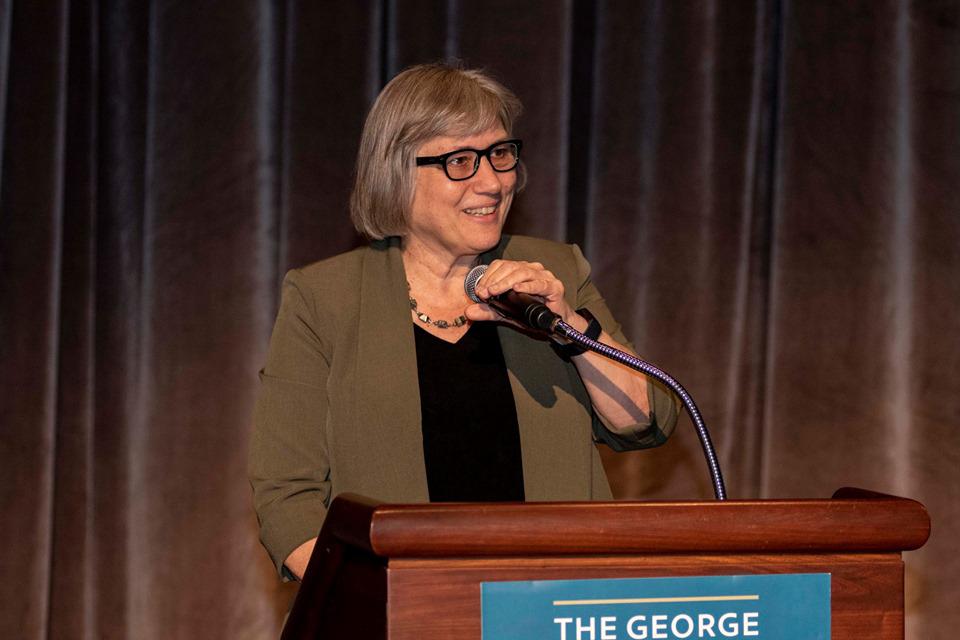Updated: August 20, 2019 at 12:08 a.m.
Officials in the School of Medicine and Health Sciences will launch a leadership-focused doctoral health sciences program in fall 2020.
The Leadership in Clinical Practice and Education program will teach students how to improve clinical and educational organizations by designing, implementing and leading new health care programs. Joyce Maring – the program director and chair of the Department of Health, Human Function and Rehabilitation Sciences – said the curriculum will teach doctoral graduates to evaluate and solve administrative issues throughout their course of study and in the workplace.
“This program is ideally situated to prepare graduates to become leaders by enabling them to address the complex demands of the current healthcare environment,” Maring said in an email.
University spokeswoman Lisa Anderson said the application is open until Nov. 1, and students will matriculate into the program next spring. The program will continue to accept applicants on a semester basis, she said.
Maring said the program is designed for people working in several health care careers, like occupational therapists, nurses, speech pathologists and physicians. All credentialed health care professionals and educators with a master’s degree and at least one year of working experience in their field are eligible to apply, she said.
Maring said she and a task force of “experienced educators” developed the program with support from Reamer Bushardt, the senior associate dean of health sciences. She said the health sciences curriculum committee, medical school executive committee and the Council of Deans reviewed the curriculum once completed.
Officials designed the program to teach students “advanced and evolving skills” needed to serve as effective leaders in clinical health care practices and in educational institutions, Maring said. The 48-credit program will primarily be taught online and will take four to six semesters to complete if taken part-time, according to a release on the medical school website.
She added that the program focuses on developing four skills – designing and evaluating clinical and educational programs, leading inter-professional teams, identifying “knowledge and practice gaps” in clinical practice and education, and conducting “action-oriented” research to solve health care issues. Graduates will eventually conduct research on how to improve clinical and educational programs, Maring said.
“School officials, and especially the leadership in health sciences, determined a need to enhance leadership competencies in health professionals whether that be in the clinical or academic environment,” Maring said.
Maring said the curriculum will be adapted according to “gaps and problems” in health care systems that students in the program want to prioritize. She said the program will prepare graduates to design protocols that standardize health care practices and make decisions to improve health outcomes for patients and communities.
“Given the DHSc’s emphasis on authentic learning, we expect to spend considerable time on best methods and practices to identify gaps and needs relevant to the learner’s environment,” Maring said.
She added that officials will accept students into the program on a semester basis and expects 10 students to enroll this spring.
Health care leadership experts said leadership programs give students and professionals the management skills necessary to advance to higher positions in clinical practices and educational institutions.
Nancy Spector, the co-director of the executive leadership in academic medicine program at Drexel University, said more medical schools now offer similar training programs because students have expressed interest in improving their leadership skills to qualify for positions at medical organizations.
Spector said health care professionals should participate in leadership training throughout their careers because they can apply different leadership skills – like knowing how to lead interdisciplinary teams or manage hospital finances – in higher-level roles.
“If you learn basic skills early on, those are foundational and you’ll be able to build on those skills over time,” she said.
Spector said women who participate in leadership trainings can gain the skills necessary to ascend into higher leadership positions in health care practice and education, where she said women are typically underrepresented.
She said women need to find the balance between “assertive” and “nurturing” styles of leadership to become effective health care leaders because women who display “aggressive” leadership are viewed less positively by their male counterparts.
“There’s been a lot of attention over the years towards women in leadership training because there is not gender equity in leadership levels within health care systems or in the medical system,” she said.
Brian Zink, the co-director of the leadership development program at the University of Michigan, said leadership programs can serve as a “vaccine against burnout” for people working in health care fields. Zink said leadership programs teach health care professionals how to persevere when frustrated by “system-level” problems, like health care insurance regulations, impede patient care and education.
“Leadership training gives you that bigger picture of what’s going on in the world and it gives you some tools to try to ride through hard times and to just have a deeper perspective,” he said.
Sunita Mutha, the director of the Healthforce Center at the University of California, San Francisco, said that all students who participate in health care-oriented leadership programs should reflect on their strengths and weaknesses as leaders to improve their leadership skills.
“There’s a self-awareness that you need to improve and grow to do well, and that’s regardless of whether you’re a student or someone else,” Mutha said.
This post was updated to reflect the following correction:
The Hatchet incorrectly reported that the program takes a year to complete if taken full-time. The program can be completed in four to six full-time semesters if taken part-time. The Hatchet also incorrectly attributed information to Lisa Anderson. The information has been re-attributed to Joyce Maring. The Hatchet also updated this post to clarify that while students will matriculate in the spring, they will be accepted on a semester basis. We regret these errors.





